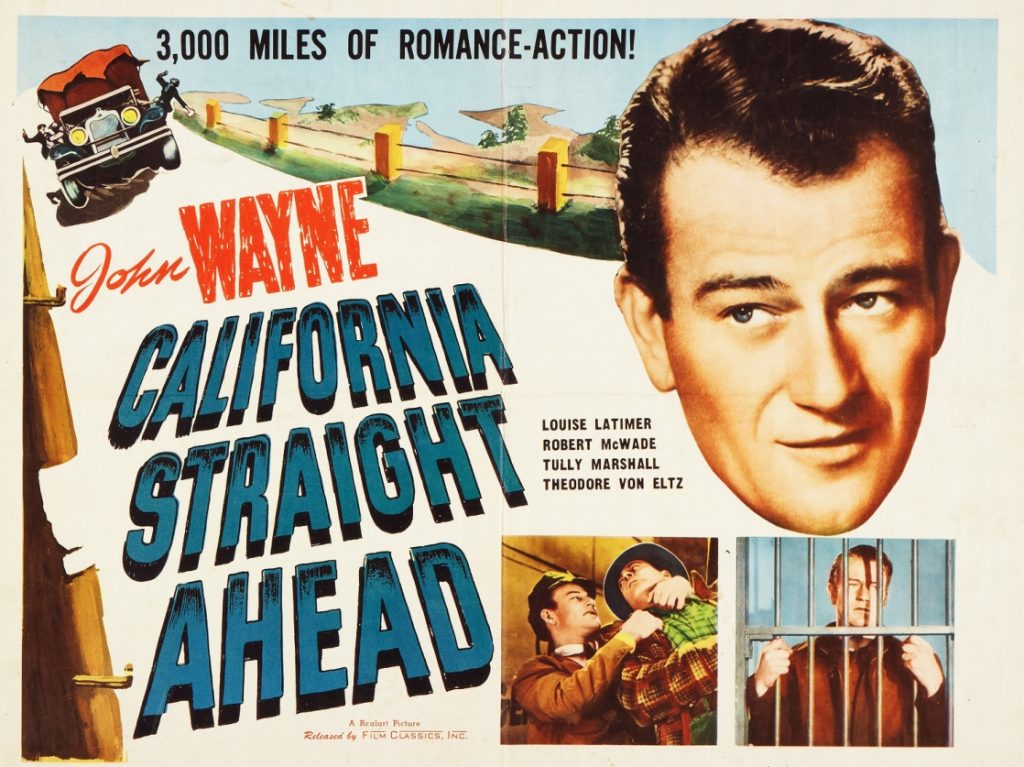In this, the third of the six films John Wayne starred in for Universal in the mid-1930s, he plays school bus driver Biff Smith who sings “Merrily we roll along” with the youngsters, the cynic in me anticipating that something pretty awful is going to happen to Biff, the bus, and the kids at some point.
California Straight Ahead (1937) Universal, Dir: Arthur Lubin b/w, 67m
Cast: John Wayne, Louise Latimer, Robert McWade, Theodore von Eltz, Tully Marshall, Emerson Treacy
Before that can happen the story introduces Biff’s lady of choice, Mary, played by Louise Latimer, chatting with her bro Charlie, played by Emerson Treacy, about his new trucking business.

One of his competitors in the business, the evil-looking Padula, played by Leroy Mason, appears in the family café and starts to threaten Charlie but is interrupted by Mary’s former boss Jim Gifford, played by Theodore von Eltz, who still obviously has the hots for his former employee.
Biff arrives to see Mary just in time to catch Padula slipping one over on Charlie by sabotaging his truck which means Charlie won’t be able to fulfil his first delivery to Chicago. Mary helpfully suggests Charlie uses Biff’s bus to transport the goods instead which unfortunately consists of cheese one way, and fertiliser for the return journey.
She also adds insult to injury by telling Biff it’s about time he got a bit more ambitious and stopped working a little job for a little pay cheque, seeming to forget she gave up her job in Chicago as secretary to Gifford to work in her mother’s small-town diner.
Biff still lets her kiss him though, so he obviously doesn’t really care what she thinks.
Biff gets fired for stinking his bus up and, in an impulse buy, purchases the very vehicle that cost him his job in the first place. I have to admit I really didn’t see that one coming.
Mary eventually confesses she was the one who engineered Biff’s dismissal by phoning the bus company anonymously to complain about the smell in order that he find a more ambitious career.
When she playfully suggests that “you wouldn’t beat a woman up would you?” Biff replies playfully “not until we were married” which I thought was very chivalrous of him.
Everything seems to be going swell for both Biff and Charlie who partner up in their own business and then, before you can say “Holy Wages of Fear”, they’re offered the job of shifting a truck load of nitro-glycerine, a job that even Padula has turned down.
Despite Mary’s warning that this might not be a good thing on account of “what happened to dad” – presumably he’d been delivered to heaven in pieces a few years back – Biff insists he’ll take the load himself.
He then gets into a fight with Padula and ends up in jail with “Fish” McCorkle, played by Australian actor Harry Allen who demonstrates a pretty convincing Cockney accent for an Aussie.
With Biff out of the picture Charlie draws the short straw and is forced to drive the nitro-glycerine truck himself, Padula tricking him into taking the vehicle down the wrong road. The truck gets stuck in the mud and, like father like son, poor old Charlie gets blown to kingdom come.
This obviously puts a bit of a downer on the marriage plans of Biff and Mary, with Mary leaving town and taking up her old job in Chicago with “Hands-on” Gifford.
Biff finally digs deep and gets himself some moxie – this is what happens when you watch old 1930s movies, you end up talking in a language that no longer exists – and ingratiates himself with old man Corrigan, played by Robert McWade, the boss of a large trucking company who gives him the break he needs.
Rising quickly to a role as a superintendent Biff finds himself up against Mary’s boss Gifford who gives ruffian Padula a job on account of the firm that Biff works for has put him out of business.
In the meantime, in what I can only describe as a convoluted plot twist, Biff gets fired by Corrigan for doing something that has upset a company that then affects the financial well-being of Corrigan’s company so in desperation Biff comes up with a plan to prove that trucks can do long haul as well as short haul business which means a race between trucks and the railway to deliver goods for a ship moored in Los Angeles before a strike shuts everything down with a million dollar contract going to the winner. I think.
Biff’s caravan of trucks compete against the train through snow and rough weather, the “race” itself more of a compilation of stock footage on account of this being a low-budget film.
When Gifford realises Biff is going to win the million dollar contract he orders Padula to do his sabotage thing and intercept Biff and his drivers. In the process the car that Gifford, Biff and Mary is travelling in crashes.
On the way to the hospital Padula, knowing he’s not going to make it, confesses his part to Mary in the death of her brother Charlie.
It’s all a bit predictable at the end with Biff’s drivers getting their goods to the boat in time, old man Corrigan presumably giving Biff his job back so that he can marry Mary.
It’s quite an action-packed film considering it only runs for just an hour but the downside is there’s obviously no time for any subtlety in terms of direction or cinematography or even acting for that matter.
There’s an impressively atmospheric feel to the scene in which Charlie meets his maker but apart from that “California Straight Ahead” is rather pedestrian, to say the least. Probably the weakest of the six Universal films Wayne appeared in so far but still worth a look for the uninitiated amongst you.
